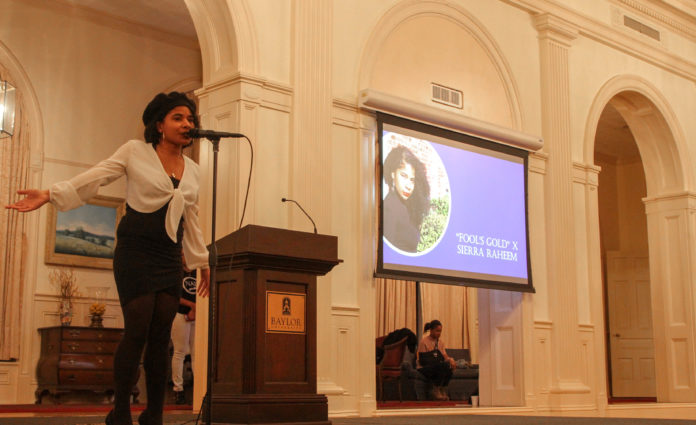
By Lizzie Thomas | Reporter
Students gathered to hear several women perform spoken word pieces in honor of Black History Month Thursday night.
According to Grapevine senior Kennedy Dendy, vice president of the National Association of Black Journalists (NABJ) at Baylor, the organization’s purpose is to increase the number of minority journalists in newsrooms across the country.
“[We] provide a place for everyone to get together and talk about — not just journalism — but what’s happening in and around the world,” Dendy said. “For NABJ, you don’t have to be black, you don’t have to be a certain race or ethnicity, but we really welcome all people to get to know all we are and all we do.”
The performers spoke about their personal experiences with microaggressions and feeling like the token friend among other topics.
Aurora, Ill. junior Sierra Raheem performed “Fool’s Gold,” in reference to feeling like a token, or a false “golden” example of the people she represented to her friends.
“I was thinking about writing the piece, I was thinking about what would transcend with the audience,” Raheem said. “I thought about my experience going to a mostly white school from middle school to high school, and there were things that people would tell me that they thought were okay. It made me think about and realize, ‘Well, why would they think it’s okay to tell me this and not tell my other black peer this?’ That’s when I realized I was viewed as a token.”
In “Fool’s Gold,” Raheem recounted her friends telling her she was likeable because she didn’t act “ghetto,” the times her blackness became a punchline and the times she was expected to know everything about black culture.
“That’s when I realized that I fell for Fool’s Gold, that every moment had no value because I was the mask they hid behind, and the minute I dared to rev my engine and break down their wall of racism, prejudice, microaggression and stereotype — did they too cheapen my value,” Raheem recited. “I was no longer an asset, no longer golden. But most importantly, I was no longer their token. But I didn’t care — I was no longer their token.”
According to Raheem, people can avoid microaggressions and tokenism by realizing that a black person is not obligated to know everything there is about black culture, and that there are better ways to ask a question than by projecting a microaggression.
Raheem also recommended that people look at their relationships with their black friends and to make sure they care about their issues rather than crossing off “racist” through that friendship.
Saint Martinville, La. junior Kristen “Monae” Mouton performed “Lost in Translation,” a piece about her ancestry, and the fact that so much about it is unknown.
“There is a tongue hidden beneath my own,” Mouton recited. “A hidden language I no longer have access to — a 400-year-old lock around my sound box, choking my vocal chords. Will I ever remember what I was supposed to sound like? Without a mother country, how can I still be a daughter?”
Mouton ended the scheduled evening before an encore of spontaneous pieces with a powerful message to finish off her piece.
“I do not want America. No, I will not go back to Africa. Thanks to your ancestors, I wouldn’t know where to go. My ancestors built this country on your terms and there would be no America without us. So I will fight, and I will resist until it is restructured — on mine,” Mouton recited.





